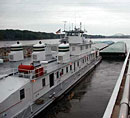Life on a Towboat
By Patty Marsicano
September, 2000
The day to day responsibility for moving massive amounts of cargo on the Upper Mississippi River rests on the shoulders of a small group of people called a towboat crew.
As a towboater, your job is to safely and efficiently drive barges loaded with grain and other products from point A to point B, pick up a new load and go back again. Careful not to let the barges break away from the boat or each other. Work six hours on, six hours off, for 28 days straight. Never leave the boat. Carry heavy equipment and endure the danger of being struck by a deadly tow line or falling overboard and being sucked under by the undertow. You're fairly well paid, your "room and board" is taken care of. You've got a bed, meals, and a shower. But you don't see your family for a month at a time. Sometimes you feel like you're in prison.
There's no such thing as "stopping for the night." You keep the boat and barges moving, through the early morning sunrise and late night darkness. When your co-worker wakes you up at 11 o'clock at night to start your shift, you rise, no matter how tired you are, because your colleague is even more tired, having been at it for six hours and it's his time to rest now.
You come from a rural part of Missouri, where there aren't many options for decent-paying jobs. Towboating is one of them. You might not see this as a lifelong job, having your sights set on other things. But then again, you might have been at this almost three decades, and you'll be a towboater until you retire, maybe a couple of decades from now.
The barge industry would cease to exist without your labor. Thanks to you, the Mississippi River carries up to 70 percent of the grain that's exported out of the United States every year. Minnesota alone exports more than 3.5 billion dollars in goods by river every year.
The creation and maintenance of a navigation channel on the Mississippi River has been the subject of industry and congressional debate and legislation for well over 100 years. A new proposal to expand the lock-and-dam system has ignited discussion about cost, necessity, and the implications for the environment.
But without towboat crews to shepard the cargo, all of these discussions would be moot.
A 1994 study estimated that in the five states through which the Upper Mississippi River flows, the barge industry employs an estimated 48,000 people. This is what we captured watching nine of them. During an overnight ride on the towboat Milton V. Roth.
By Patty Marsicano
September, 2000
The day to day responsibility for moving massive amounts of cargo on the Upper Mississippi River rests on the shoulders of a small group of people called a towboat crew.
| |
|
|
|
||
There's no such thing as "stopping for the night." You keep the boat and barges moving, through the early morning sunrise and late night darkness. When your co-worker wakes you up at 11 o'clock at night to start your shift, you rise, no matter how tired you are, because your colleague is even more tired, having been at it for six hours and it's his time to rest now.
You come from a rural part of Missouri, where there aren't many options for decent-paying jobs. Towboating is one of them. You might not see this as a lifelong job, having your sights set on other things. But then again, you might have been at this almost three decades, and you'll be a towboater until you retire, maybe a couple of decades from now.
The barge industry would cease to exist without your labor. Thanks to you, the Mississippi River carries up to 70 percent of the grain that's exported out of the United States every year. Minnesota alone exports more than 3.5 billion dollars in goods by river every year.
The creation and maintenance of a navigation channel on the Mississippi River has been the subject of industry and congressional debate and legislation for well over 100 years. A new proposal to expand the lock-and-dam system has ignited discussion about cost, necessity, and the implications for the environment.
But without towboat crews to shepard the cargo, all of these discussions would be moot.
A 1994 study estimated that in the five states through which the Upper Mississippi River flows, the barge industry employs an estimated 48,000 people. This is what we captured watching nine of them. During an overnight ride on the towboat Milton V. Roth.

